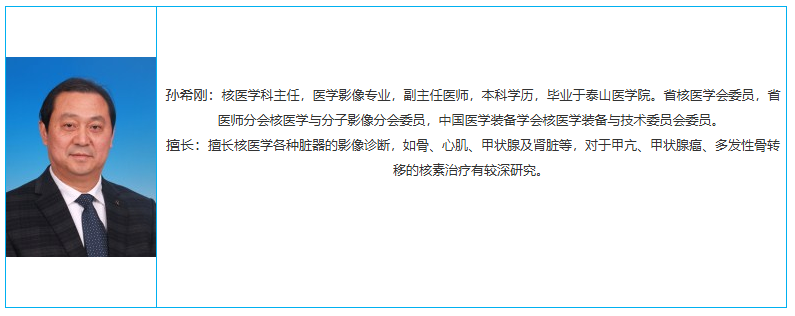- Date:2020-10-07
The nuclear medicine department of Liaocheng Second People's Hospital was established in 1996, and the large-scale equipment ECT purchased in 2006 has improved the detection means of the department of nuclear medicine. There are 7 medical and nursing staff in the nuclear medicine department, including 5 medical and nursing staff with the title of intermediate grade or above, 1 deputy chief physician, 1 attending physician, 3 supervising nurses and 1 supervising technician. The head of the department is Sun Xigang. The medical staff of the department in the Beida Hospital, Fudan University Affiliated Zhongshan Hospital, Southeast University Affiliated Zhongda Hospital for systematic training and further training, and actively participate in academic exchanges, grasp the latest technology and the latest developments in this academic speciality, and apply them to the clinic in a timely manner.
Under the leadership and strong support of the hospital, the department is equipped with advanced medical equipment, including SPECT, M-N-6300XT nuclear multifunctional instrument, activity meter, surface contamination detector, iodine dispenser and so on, produced by the American GE Company, and has set up microcomputer numerical control radioactive wastewater treatment system, fume cupboard, drenching pool and other supporting systems, which have successfully passed the evaluation and acceptance of the provincial and municipal environmental protection bureaus and expert groups.
Nuclear medicine is an important part of modern medicine, nuclear medicine department to carry out the scope of diagnosis and treatment:
Items carried out: (1) Skeletal system: 1, early diagnosis of primary and metastatic bone tumour 2, early diagnosis of aseptic necrosis of femoral head 3, clinically suspected metabolic bone disease 4, observation of blood supply and survival of transplanted bone 5, unexplained bone pain and so on. (II) Endocrine system: 1. Diagnosis and differentiation of thyroid nodules 2. Diagnosis of ectopic thyroid 3. Diagnosis, quantitative analysis and treatment of hyperthyroidism 4. Postoperative treatment of differentiated thyroid carcinoma 5. Auxiliary diagnosis of various thyroiditis. (C) Circulatory system: 1. Early diagnosis, differentiation, determination of site, scope and degree of myocardial ischemia and infarction; 2. Normal coronary angiography and determination of myocardial ischemia caused by suspected small vessel abnormality; 3. Diagnosis and differentiation of myocarditis and cardiomyopathy; 4. Evaluation of therapeutic efficacy before and after coronary artery disease surgery; and so on. (D), pulmonary embolism and renal function test has unique advantages. In particular, it is unique in radionuclide targeted therapy for hyperthyroidism, nail cancer and multiple bone metastases.
Advantages of nuclear medicine examination: 1, convenient and non-invasive, oral or intravenous injection; 2, with the characteristics of targeting, high selectivity, sensitivity; 3, early diagnosis, such as bone metastasis than ordinary X-ray 3-6 months ahead of the discovery of the lesion; 4, large field of view: an examination, the whole body imaging; 5, able to quantitative analysis, such as the ejection fraction, the iodine uptake rate of the thyroid gland, the GFR; 6, functional imaging: dynamic, real time, GFR, etc.; 6. Functional imaging: dynamic, real-time, in vivo observation of the blood flow metabolism of the diseased organ and even molecular level information changes; 7, diagnosis and treatment: both diagnosis and treatment of diseases by internal irradiation, such as hyperthyroidism, thyroid cancer, bone metastasis.
Introduction to the staff of this department
Sun Xigang Male, Deputy Chief Physician, Director of Nuclear Medicine Department, Deputy Director of Outpatient Department. He is a member of Shandong Province Nuclear Medicine Association and Shandong Provincial Physicians Association Nuclear Medicine Branch. he joined the work in 1993 and majored in medical imaging in Taishan Medical College. She has published more than 10 professional papers, 3 scientific research achievements, 2 patents, and 2 edited books. Speciality: diagnosis of various organs, bone metastasis, hyperthyroidism, thyroid cancer and other diseases of nuclear treatment, ‘C’ arm guided intervertebral disc removal.
Du Guizhen, female, nurse in charge, graduated from Linqing Health School in 1984.
Liu Yan, female, supervisor nurse, graduated from self-test undergraduate degree, joined the work in 1993. She is a nurse in the Department of Thoracic Surgery, and was transferred to the Department of Nuclear Medicine on 27th April 2007 to participate in nursing work.
Yuan Shiqiang Male, technician in charge, graduated from Taishan Medical College in 2006.
Zhao Fang Female, attending physician, graduated from Hebei Medical University in 2010.
Cai Wei Female, Supervisory Nurse, graduated from Anhui University of Science and Technology.
Tian Xu Male, Physician Graduated from Taishan Medical College in 2014
Tel: 0635-2342394 2342395
Contact: Sun Xigang
Address: Department of Nuclear Medicine, Medical Technology Building, Liaocheng Second People's Hospital, No.306 Health Street, Linqing City, Shandong Province, China.




 鲁ICP备11009722号-4
鲁ICP备11009722号-4 